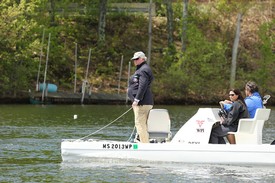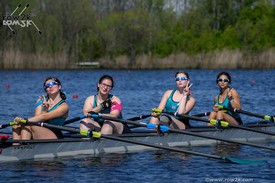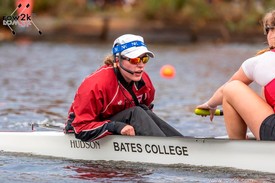Ron Chen

Respected rowing referee Ron Chen has umpired at arguably every major championship in North America, and arguably the world, with frequent appearances at World Championship regattas, as well as the Olympics. In his "off" time, Chen has also had a career as a respected lawyer, and in January of 2006 was named the New Jersey Public Advocate. He served as Vice Chair of the New Jersey Supreme Court Committee on Professional Ethics from 1996 to 2006, and as a member of the American Civil Liberties Union National Executive Committee from 2002 to 2006 (read more about Ron's law career here). He has also served as Secretary and a member of the Board of Directors of the U.S. Rowing Association. Chen got started in rowing at his alma mater Dartmouth College. We talked to him about his new job, and about the overlaps and interstices of advocating at regattas and state meetings.
row2k: You were named Public Advocate for the state of New Jersey in January of 2006; this seems a job particularly well suited to a judge-referee (or vice versa); have you seen any parallels between the two roles? Differences?
Ron Chen: Well, the two jobs play to different parts of my persona. As a referee, I am supposed to be detached, neutral, and not particularly noticeable. (The old adage about sports officials is that the best ones are those who you don't even know are there). As a public official charged with advocating for those who might not otherwise have an advocate, it is inevitably part of my job to "make some noise" and get people's attention. So it's a different role.
On the other hand, as with any "decision maker," it is important to project a degree of thoughtfulness, deliberation, and reason, and I have definitely borrowed from my experiences as a referee on that score and used them in my new public duties. It is not only the actuality, but the perception, of being thoughtful before making a decision, that is important to both roles.
row2k: Were there any specific instances where one role informed or illuminated the other?
Ron Chen: At a specific level, see next answer. (If there were that much of an overlap in a particular instance, I might have to recuse.) Other than that, only on a very superficial level, where I have occasionally extended the greetings of the Governor to the national team, handed out a medal or two, etc.
At a general level, one thing a referee has to do is make a decision relatively quickly, which is obviously something that is also required of high level management in any organization. I would also say that the global perspective that I have received from rowing in my activities as a FISA umpire and FISA commission member give me a very good background in understanding how globalization affects a number of public policy issues in the state. And my experience on the USRowing board gave me a lot of background in management of a small non-profit mission driven organization, which translates well to what I do now, albeit in a public entity.
row2k: You had to recuse yourself from some roles in the rowing community; what were those, and what created a situation where you felt you had to step back?
Ron Chen: It doesn't come up that often, but there have been a few times when a specific rowing issue (such as the elimination of men's rowing at Rutgers) became a matter of public discussion in New Jersey and came across my desk as Public Advocate, and because of my role in USRowing I thought it best to recuse and let the Assistant Public Advocate (who doesn't know the difference between rowing and kayaking) handle it.
Then I recall a citizen complaint coming in about access to "inland waterways" in NJ (which is a fascinating legal issue) and which was related to work the Public Advocate has done in access to beaches. The citizen turned out to be a sculler who wanted access to a lake encircled by private homes. I didn't get involved directly and was told about it only after the fact, but it did cause me to become more informed on the interesting law in this area.
Rowing was the activity in which the ethics officials agreed that I wouldn't have to engage in wholesale recusals (unlike the ACLU, where I had to resign from every position I held), but I did step down from the USRowing board voluntarily in 2007. After 10 years on the Referee Committee and then 9 years on the Board, I was due for a sabbatical anyway.
What is interesting is how my rowing friends react now that they occasionally see me in the public media in my other role. They are so used to thinking of me as a referee that they have trouble imagining me as anything else. But I guess that is true about the rowing community generally. The ties that bind us bring together a fascinating group of people who have very diverse careers.
row2k: You have some specific referee tools that come with some history attached to them; what are they? Have you ever wanted to use one in a state meeting?
Ron Chen: There are days I would love to use my power megaphone in talking with the state legislature! Is that what you mean? And a FISA bell would be very handy at a Cabinet meeting. But I doubt other state officials would understand the history behind the Silken Laumann Starter's flag from Indianpolis (WC '94), or why it should strike terror in the hearts of rowers worldwide.
row2k: Which is messier, umpiring or governing?
Ron Chen: Well, very much the same thing in some ways. Unlike some other sports, which have rules that are applied on a very technical level (you either stepped out of bounds or you didn't), officiating in rowing is much more a matter of judgment about when to intervene (and even more importantly), when NOT to intervene. Subjective judgment is inevitably "messier" sometimes because there is no black and white rule. I may have to decide whether a crew out of its lane did or did not interfere with another crew, and ultimately all I have to the crews is my credibility and hope they trust it. There is no "instant replay" in rowing. (Well, there is at the finish line, but apart from that).
row2k: Can you recall a best, worst, wildest, or most memorable race or regatta you have officiated?
Ron Chen: As adverted to above, the best officiating jobs are those that don't get attention, so it might seem immodest if I point to a few instances when I think I was able to pull the chestnuts out of the fire, because competitors would then wonder whether there was ever really a problem. There were a whole series of potentially explosive issues that came up in the 1980s and 1990s at national team trials (when I was the "trials czar" for referees and usually the Chief Referee at trials as well) -- but perhaps that will have to wait for my memoirs.
And of course, where national team selection is concerned, my skills as a lawyer often end up being more relevant than my skills as an on-the-water referee. Recently, I was asked to be chief referee at the Masters Nationals somewhat at the last minute due to an internal dispute between the referees and the Masters Committee about static refereeing, and we were able to pull off a four day regatta with a skeletal officiating crew with virtually no hitches and with the introduction of a number of regatta management initiatives (static refereeing, single trailing umpire, new marshalling mechanics, letter prefixed bow numbers). I actually am very proud of that, but again not anything that competitors would or should notice.
It is easier to identify the disasters. The finals of the W4- at the 1990 National Champs, which were also serving as the trials selection for the Goodwill games, is one of those I still relive and wonder what more I could or should have done. Three crews crossed the finish line with interlocking oars, and the entire race was of the same character, in which I was waving my flag for just about the entire race. What was notable about it was that it was taped in full by a professional videographer, so it was used as a training tape for several years thereafter about everything that could go wrong. (I used every flag I had, and I believe every command described in the rulebook, including the somewhat ineffective "Stop!" command directed to a particular crew, which of course never works.) When I got out of the launch I muttered something about it being the "race from hell" which was overheard by a reporter and duly reported, but I think they thought that "race from hell" was an official designation in the rulebook (reprimand, warning, exclusion, race from Hell, etc.) and it has since been universally known as the Race from Hell.
On a related topic, there are a number of instances when I sometimes find it difficult in maintaining the somber and deliberative demeanor expected of a race official, without cracking a smile. Of course it is well known that junior or scholastic crews sometimes have trouble locking on to stakeboats, but twice I have had a crew back in *bow first* and then sit there serenely waiting for the start to be given. While I didn't want to humiliate the crews (both boys crews, for what it's worth), it was hard not to laugh out loud.
Similarly, at the 1988 Olympic Trials, there was a protest hearing on whether there had been outside interference with one of the crews caused by a gelatinous substance in the water, at the time identified as "frogs eggs" but probably some form of algae colony. Given the stakes involved, we of course commenced an investigation, managed to retrieve the substance in question from the water, and eventually made a factual finding that it was insufficient to have affected the outcome of the race. But the scene of all the gray eminences of rowing, bedecked in their blue blazers and FISA badges, poring into a cardboard box filled with a lot of goo, in oirder to decide the composition of the Olympic team, presented a cognitive dissonance that I think caused me to chuckle out loud, and the incident has since been known as the "Frogs Eggs appeal." (Barb Grudt was involved so she may not have thought it was so funny).
row2k: It's hard to imagine, but can refereeing on weekends possibly be a respite from your other duties?
Ron Chen: ABSOLUTELY! I think that if I didn't have those Saturday mornings on Lake Carnegie to look forward to, in which I can recede into my prior private existence with my old friends and colleagues, I might have lost it in the past three years. Trenton is a scary place sometimes, and we all need a safe harbor to fall back on.
If you enjoy and rely on row2k, we need your help to be able to keep doing all this. Though row2k sometimes looks like a big, outside-funded operation, it mainly runs on enthusiasm and grit. Help us keep it coming, thank you! Learn more.
Comments | Log in to comment |
There are no Comments yet
| |
- Bont Rowing
- Calm Waters Rowing
- Concept 2
- Craftsbury Sculling
- The Crew Classic
- CrewLAB
- Croker
- Dad Vail Regatta
- Durham Boat Co.
- Empacher
- Faster Masters
- Filippi
- Fluidesign
- h2row.net
- HUDSON
- Live2Row Studios
- Nielsen-Kellerman
- Oak Ridge RA
- Peinert Boat Works
- Pocock Racing Shells
- Race1 USA
- Rockland Rowing Masters Regatta
- RowKraft
- Rubini Jewelers
- Vespoli USA
- WinTech Racing
- Bont Rowing
- Calm Waters Rowing
- Concept 2
- Craftsbury Sculling
- The Crew Classic
- CrewLAB
- Croker
- Dad Vail Regatta
- Durham Boat Co.
- Empacher
- Faster Masters
- Filippi
- Fluidesign
- h2row.net
- HUDSON
- Live2Row Studios
- Nielsen-Kellerman
- Oak Ridge RA
- Peinert Boat Works
- Pocock Racing Shells
- Race1 USA
- Rockland Rowing Masters Regatta
- RowKraft
- Rubini Jewelers
- Vespoli USA
- WinTech Racing

















